Kate Rauner's Blog, page 95
August 13, 2014
Writer’s Block – a poem by Kate Rauner

At Eternity’s Gate by Van Gogh
Alas the poem’s beyond my grasp.
The muse elides,
The words fade fast.
Between my skill and need I’m torn,
Bereft of rhymes and left forlorn.
Will the sun rise again?
Will night end and day begin?
Then like the fool that I’ve become
Rhymes beat, my brain their drum.
Oddly enough, this poem emerged almost fully complete as I woke up one morning.








August 10, 2014
Ebook Battles – the Penny Dreadfuls of Our Time?

Penny dreadful from 1800s
I recently received an email from Amazon/Kindle Direct that included some information on paperback books. “Just ahead of World War II, there was a radical invention that shook the foundations of book publishing.” Although the Penny Dreadful had been around since the 1800s, this was, apparently, something new.
The invention was the paperback book, which cost about what a movie ticket cost at the time and a tenth of what a hard-cover book cost. Amazon draws a parallel with today’s ebooks. Then and now, they say, traditional publishers felt threatened. Today, they say, some publishers are trying to keep ebook prices close to paperback prices.
There is a lot of “they say” in that paragraph because Amazon is battling Hachette in a contract dispute – search “Amazon Hachette ebook” for lots more like this. Myself, I don’t understand why this fight got so big – if Hachette prices their books too high compared to others, won’t readers simply stop buying from them? That seems way too simple an analysis, so clearly I’m missing something. But I thought the story of paperback books was interesting.
You can read Amazon’s email to their Kindle authors at www.readersunited.com








August 9, 2014
Climate Change: A Scientific Phenomenon
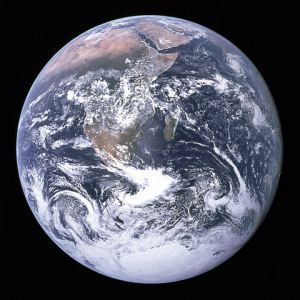 I’ve found the global warming/climate change debate to be frustrating. The Earth is too large a system to grasp intuitively. In such a large system, anyone can “cherry-pick” a small subset of data to illustrate any point. Many discussions seem to distill down to: “You’re lying!”
I’ve found the global warming/climate change debate to be frustrating. The Earth is too large a system to grasp intuitively. In such a large system, anyone can “cherry-pick” a small subset of data to illustrate any point. Many discussions seem to distill down to: “You’re lying!”
I posted on the social aspects of the debate previously . Today I will discuss the science of global warming and climate change. (“Global warming” refers to average global temperatures while “climate change” refers to the effects.)
Global warming is complex enough to make my eyes cross. It involves many parameters that must be examined over decades and preferably centuries. I will frequently use information from http://www.skepticalscience.com/. This site provides the largest and most accessible collection of responses to global warming objections I’ve found, with a handy with mouse-over glossary in the text. While unabashedly defending mainstream climate science against “climate myths”, the site also provides an exhaustive list of objections: 174 of them!
I leave you to explore as many of the 174 objections as interest you. Here are my favorites:
Objection: Temperature increases have stopped.
Excerpt from SkepticalScience Response: The gif chart presented to show temperature continues to increase has become somewhat famous. I’ve inserted a screen-capture 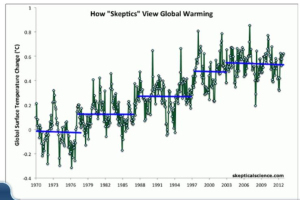 of the chart at left. It shows an overall upward trend in temperatures with several plateaus along the way. You can view the gif chart here.
of the chart at left. It shows an overall upward trend in temperatures with several plateaus along the way. You can view the gif chart here.
Another response: This op-ed by Dr. Peter Gleick is a must-read. “These statements [that global warming has stopped] are scurrilous deceptions and falsehoods. The planet is warming – an observation noted by every climate research institution tracking temperatures, the US National Academy of Sciences (over and over and over), every other national academy of sciences on the planet, and every professional society in the geosciences.”
My Comment: I’ve worked with large sets of data myself (not related to climate). It seems entirely reasonable to me that a trend measured over decades in a complex system will show ups and downs, and that comparing a couple local maximums can give a false impression of stasis.
Objection: There is no consensus.
I have often failed to describe to friends the type of consensus that is meant. If obviously there is discord and disagreement, what is meant by consensus? Here is a fine description from a self-proclaimed denier turned warmer:
“Don’t confuse consensus with consensus. This one had me confused for a long time. Like the word theory, which has a drastically different meaning in science than it does in the vernacular, consensus can mean two very different things. In politics a consensus is an aggregate expression of opinion. It’s only as valid as the majority agrees it is. In science it is a description of where the science has led… [T]he consensus is not what gives power to the conclusion, the science leads to the conclusion.” http://skeptoid.com/blog/2011/06/15/i-global-warming-skeptic/ The entire post is excellent, with advice for left and right-leaning readers.
Excerpt from SkepticalScience Response: “In the scientific field of climate studies… the consensus is demonstrated by the number of scientists who have stopped arguing about what is causing climate change – and that’s nearly all of them. A survey of 928 peer-reviewed abstracts on the subject ‘global climate change’ published between 1993 and 2003 shows that not a single paper rejected the consensus position that global warming is man caused (Oreskes 2004).”
My Comment: I wrote a lot of words about “consensus” because it is very important to my thinking. A bumper-sticker doesn’t cut it here – I must say “consensus in the scientific, peer-reviewed literature”. I don’t think I’ve read any significant disagreement with the SkepticalScience response.
Those who object to the consensus statement publish lists of people who disagree with the scientific consensus, but do not dispute that the published, peer-reviewed literature is overwhelmingly in agreement on global warming. The only counter response I’ve seen is a conspiracy theory: scientists are too scared of authority or too corrupted by research grant money to oppose the mainstream theory of global warming. I have worked in a scientific field (though not in the climate sciences). In my experience, most scientists would love to overturn an established theory. It would make their career. I would have to see strong evidence that a conspiracy has controlled climate scientists world-wide for decades. I have not seen such evidence.
In summary:
I am not an expert in climate science and never will be. This is true about most scientific topics. What can a reasonable person do?
I follow a simple heuristic: Accept what the science says when the experts mostly-all agree. Realize that experts change their minds and be alert for updates. Headlines can be misleading, so try to learn about the details.
I accept: The Earth is warming and climate is changing in response. Human activities, including fossil fuel burning and land use practices, are forcing a change unprecedented in civilization’s history. This will lead to negative impacts on ecosystems and people in many ways.
I believe: Everyone in the world deserves a chance to prosper the way America prospers, and that Americans deserve to continue to prosper, too. “You are a child of the Universe, no less than the trees and the stars. You have a right to be here.” [Desiderata] Population growth in wealthy countries is dropping, so encouraging all countries in the world to prosper may be the best win-win tactic we have. It is ironic if the prosperity some Environmentalists tell us we must abandon may actually “save the world.” How decreased populations will sort out economically I can’t tell: our current model of prosperity depends on population growth, and my crystal ball is cracked and cloudy.
I have faith: We can make decisions today that reduce the pain along the way. I see ways we can adapt to specific impacts of climate change, and ways to slow the release of CO2 and other greenhouse gases. Ironically, recent increases in natural gas production are reducing carbon emissions from coal because the free market favors gas, not because of any ideology. We need more improvements like that. Future generations will grapple with these issues and come out ahead.
Note: I’ve tried to select links with a long life, but the Internet is a fickle beast and some links may be broken. Take a look at SkepticalScience or search on the terms that interest you.








August 6, 2014
Arctic Waves – a poem by Kate Rauner
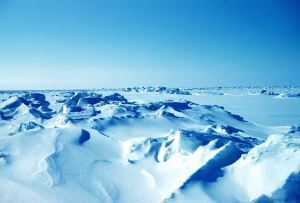
Beaufort Sea ice in 1949
Once sheltered underneath the ice,
Once shaded from the sun,
Once frozen most of the year,
Now melting has begun.
Surging swells in Beaufort Sea,
Now open water much the year,
On Yukon shore, at Prudhoe Bay,
Speaks of a change severe.
We’ll live to see who will adapt,
React to changes here,
Who will win and who will lose
And who will disappear.
“The fact that researchers have now measured swells of more than 16 feet in the Arctic’s Beaufort Sea, just north of Alaska, is a bit of a stunner. Swells of that size, researchers say, have the potential to break up Arctic ice even faster than the melt underway there for decades thanks to rapid global warming.” Washington Post








August 2, 2014
Climate Change: a Social Phenomenon
 RF_alum and I are long-time friends. I guest-post on his blog as “Ponderer”. We worked together in technical fields at the Rocky Flats Plant, a nuclear weapons facility that has since been decommissioned. We worked on weapons and in the environmental clean up. We both encountered our share of people pushing political agendas by misrepresenting science.
RF_alum and I are long-time friends. I guest-post on his blog as “Ponderer”. We worked together in technical fields at the Rocky Flats Plant, a nuclear weapons facility that has since been decommissioned. We worked on weapons and in the environmental clean up. We both encountered our share of people pushing political agendas by misrepresenting science.
While we have much in common, we also have disagreements. I’m a “warming alarmist” and RF_alum is a “denier”. We both dislike these terms (they present caricatures) but since they are used in popular discussions, I’ll repeat them here – ironically.
I’m frustrated by the global warming/climate change debate. There seem to be disagreements on so many levels that it is hard to evaluate what I hear. I think there are two separate-but-related sets of arguments.
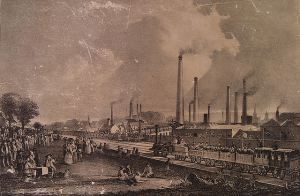
The Industrial Revolution
Today I want to discuss the argument that does not get enough explicit coverage: the social argument. I’ll cover
science in a future post.
For many people, climate change is the latest battle in a long-standing war over Environmentalism. Environmentalists
seek to protect natural resources and ecosystems through the political process by lobbying, activism, and education. The movement started early in the Industrial Revolution. We tend to forget how severe environmental impacts once were and take for granted the improvements between 1850 and 1950.
 Although Americans are still interested in the environment, it is not a top priority. To capture waning public attention, some environmentalists stage bizarre events that create skepticism about their motives. As stated in one Wikipedia quote, they launch “an attack on middle-class American capitalism.” Or, as a friend said to me recently, “they only want everyone to think badly of man and man’s negative effects on the planet.”
Although Americans are still interested in the environment, it is not a top priority. To capture waning public attention, some environmentalists stage bizarre events that create skepticism about their motives. As stated in one Wikipedia quote, they launch “an attack on middle-class American capitalism.” Or, as a friend said to me recently, “they only want everyone to think badly of man and man’s negative effects on the planet.”
But pollution is a real issue. If your neighbor pours something noxious into the river (or air) upstream from where you drink (or breath), he is unfairly taking something of value from you. If he is a wealthy factory owner and you are an individual, you need a social movement to address your problem.
Environmentalism has brought much good to America. Our waters and air are cleaner and healthier. We no longer accept pollution levels currently seen in China. Here is a less obvious example of Environmentalism improving our lives: There is compelling evidence that reducing lead pollution, especially removing lead from gasoline, has reduced violent crime.
As I wrote here, to discuss such deeply significant topics, you need a relationship with the person you are talking to. Unfortunately, the relationship between environmental opponents is one of long established animosity and distrust, with dirty tricks and hyperbole on all sides.
When possible responses to climate change became a policy issue, these familiar opponents squared off. Media pundits drew up battle lines, and their saturation of TV and radio has formed the public debate. Both sides want the same policies they have wanted for the last fifty years, and climate change is simply the current battlefield. Climate science is irrelevant.
Most extremist “alarmists” and “deniers” are entrenched and unlikely to change. I hope the rest of us can get past them. From my perspective:
There are three aspects to any problem; physical reality, ethics, and esthetics.
We need to understand our problems. Science helps us here.
We need to seek solutions. Our values and capabilities are vital to this discussion. (See a book review covering our moral foundations here: http://bit.ly/1aFdtVs.)
We need to realize that good people sometimes disagree.
Science is the best method for understanding physical reality. Unfortunately, as Carl Sagan said, “We have arranged [our civilization] so that almost no one understands science and technology. This is a prescription for disaster.” What is an intelligent lay-person to do?
In a future post I’ll discuss the science of climate change from my own, amateur vantage point.
Notes:
I’ve tried to select links with a long life, but the Internet is a fickle beast and some links may be broken. Take a look at SkepticalScience or search on the terms that interest you.
It is worth reading two Wikipedia article for the relevant history: Environmentalism and Anti-environmentalism.








July 30, 2014
Riding on Light – a poem by Kate Rauner
Light has mass equivalence,
E=mc squared
And though it’s frame dependent,
There is momentum there
So once you are in orbit,
If you can spread a sail,
Your silver wings can carry you
On winds that never fail.
A modest little CubeSat
That fits within your hands
Will demonstrate the concept
Far above our earthbound lands.
Japan’s Ikaros flew just as high
And didn’t burn its wings.
This inexpensive satellite
Will also spread its limbs.
Bring exploration into reach,
No student will be barred,
With low-cost parts from off the shelf
You’ll someday reach the stars.
Good luck to The Planetary Society‘s LightSail-1, which now has a launch date! The satellite is scheduled to hitch a ride into orbit aboard the SpaceX Falcon Heavy in April 2016.








July 26, 2014
Wool by Hugh Howey
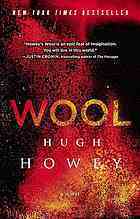 In a dystopian future, everyone lives in an underground silo so large it takes three days to climb from bottom to top. Howey’s story begins as a murder mystery surrounded by questionable suicides and lost loves. The people seem to be “us”, with technology at or a little behind today: there are computer monitors displaying green letters. The first part of the book gives detailed descriptions of moving around in this contained world, and realistic descriptions of the technology, from motor shafts to green circuit boards to Phillips head screwdrivers and the smoke curling up from a soldering iron. But about a third of the way through, the story begins to expand and the main characters become more complex. At this point, I would have preferred Howey reduce the amount of detail; I was not interested in learning how transmitters work or how to brew loose-leaf tea once the battles started. But the simple expedient of reading only the first one or two sentences of each paragraph moved me happily through the unexpected twists to the satisfying conclusion. While this book could support a sequel, it has a real ending that stands by itself. A fun read.
In a dystopian future, everyone lives in an underground silo so large it takes three days to climb from bottom to top. Howey’s story begins as a murder mystery surrounded by questionable suicides and lost loves. The people seem to be “us”, with technology at or a little behind today: there are computer monitors displaying green letters. The first part of the book gives detailed descriptions of moving around in this contained world, and realistic descriptions of the technology, from motor shafts to green circuit boards to Phillips head screwdrivers and the smoke curling up from a soldering iron. But about a third of the way through, the story begins to expand and the main characters become more complex. At this point, I would have preferred Howey reduce the amount of detail; I was not interested in learning how transmitters work or how to brew loose-leaf tea once the battles started. But the simple expedient of reading only the first one or two sentences of each paragraph moved me happily through the unexpected twists to the satisfying conclusion. While this book could support a sequel, it has a real ending that stands by itself. A fun read.








July 23, 2014
Which Came First? – a poem by Kate Rauner

Feathered dinosaurs may have looked like this
Classic conundrums
Can be solved;
Ancestors laid eggs
Before chickens evolved.
And long before
Any bird flew,
Feathers evolved
More than we knew.
Lovely plumage,
Not just fluffy bits,
Completely covered
Archaeopteryx.
Long-shafted feathers
That never saw flight,
Spread wide in display,
Were a wondrous sight.
Thanks for a wonderful new fossil discussed at National Geographic. Archaeopteryx may be the best known, but is only one of many species of feathered dinosaurs and early birds; a vibrant evolutionary bush of life. Some early birds had enough feathers on their legs to be considered as “four winged”, and there is evidence of feather colors. “Of course, like any evolutionary story, this one could be falsified or complicated by the next cool discovery.”








July 19, 2014
The Ethics of Computer-Driven Cars
 We call them driverless cars, but of course something is driving: a computer. When a human driver is confronted with a crisis, perhaps a choice between hitting a child who jumped out into the road or crashing to avoid her, there’s no time to think about deontological ethics. But a computer has plenty of time, and whoever programmed the algorithms it uses had nearly unlimited time.
We call them driverless cars, but of course something is driving: a computer. When a human driver is confronted with a crisis, perhaps a choice between hitting a child who jumped out into the road or crashing to avoid her, there’s no time to think about deontological ethics. But a computer has plenty of time, and whoever programmed the algorithms it uses had nearly unlimited time.
“The answers aren’t always clear-cut. Should a driverless car jeopardize its passenger’s safety to save someone else’s life? Does the action change if the other vehicle is causing the crash? What if there are more passengers in the other car? Less morbidly, should a Google-powered car be able to divert your route to drive past an advertiser’s business? Should the driver be able to influence these hypothetical decisions before getting into the vehicle?” time.com
When something bad happens (research shows that driverless cars will inevitably crash), who will be at fault? Who will pay the bills? Who will sue whom? Should the government set ethical standards and create legal protections? Eventually, someone will decide if my car should let me die to save more passengers in the other car. Can anyone imagine our current US Congress tackling such a task?
It seems likely that the first driverless cars will feature a super cruise control, just a step away from today’s situation. The human will still be “the driver”. Cars’ capabilities, and ethics, will evolve over time.
Perhaps a career in philosophy will become more attractive, and we’ll have competing schools of philosophy, just like in ancient Greece.
Illustration was adapted from the Swedish journal Svenska Familj-Journalen (1864-1887); copyrights expired, public domain.




















